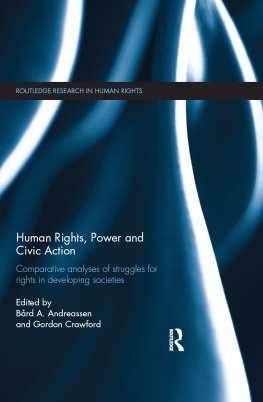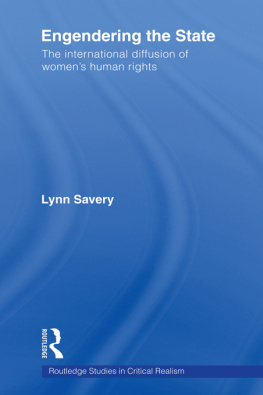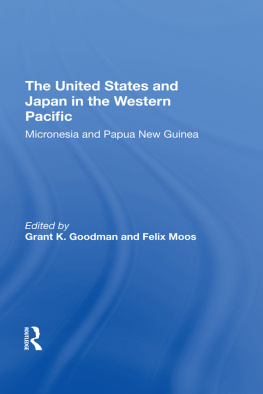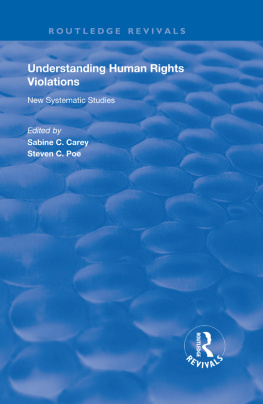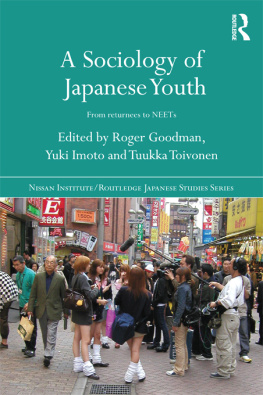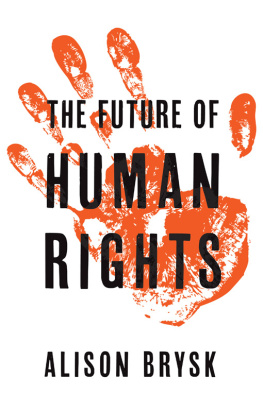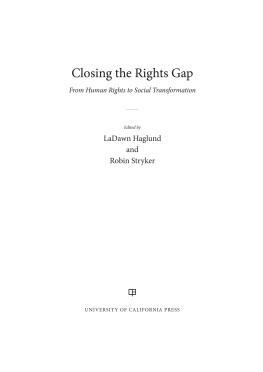Case Studies on Human Rights in Japan
Case Studies on Human Rights in Japan
edited by
ROGER GOODMAN and
IAN NEARY
CASE STUDIES ON HUMAN RIGHTS IN JAPAN
First published 1996 by
JAPAN LIBRARY
Reprinted 2003
by RoutledgeCurzon
2 Park Square, Milton Park, Abingdon, Oxon, OX14 4RN
Japan Library 1996
Transferred to Digital Printing 2005
RoutledgeCurzon is an imprint of the Taylor & Francis Group
All rights reserved. No part of this publication may be reproduced, stored in a retrieval system, or transmitted in any form or by any means, without prior permission in writing from the Publishers, except for the quotation of brief excerpts in criticism.
British Library Cataloguing in Publication Data
A CIP catalogue entry for this book
is available from the British Library
ISBN 1873410352
Typeset by LaserScript, Mitcham, Surrey, in Bembo 12 on 12pt.
Contents
| Ian Neary |
| Jayan Patel |
| Kathianne Hingwan |
| Denise Cripps |
| Roger Goodman |
| Michele Reilly |
| Howard Mulvey |
| Jonathan Ferries |
| David Forfar |
| Mika Ichihara |
DENISE CRIPPS is a publisher at Heinemann English LanguageTeaching responsible for educational materials for English language learning in East and South East Asia and Latin America.
JONATHAN FERRIES is a PhD student at the WellcomeInstitute for the History of Science, Oxford University, where he is continuing his work on the policies towards the aged inJapan.
DAVID FORFAR is a PhD student in the Department ofSociology, University of Essex, currently completing his dissertation on some aspects of the political importance of Shintoin contemporary Japan. He has recently been elected to a Junior Research Fellowship at Wadham College, Oxford.
KATHIANNE HINGWAN has degrees in sociology and Japanese studies from Essex University. She has lived in Japan for several years and is now a film researcher based in London.
ROGER GOODMAN, formerly Reader in Japanese Studies at the University of Essex, is currently University Lecturer in the Social Anthropology of Japan and a Fellow of St. Antony's College, University of Oxford. He is currently undertaking research on East Asian models of social welfare.
MIKA ICHIHARA is just completing in the Department of Law, Essex University, a PhD dissertation which centres on the legal implications of the ARE case.
HOWARD MULVEY is an English language lecturer in the Liberal Arts Faculty of Kagoshima University.
IAN NEARY is Sanwa Professor of Japanese Studies at Essex University. He is involved in a research project entided The Implementation of Human Rights: Japan, Taiwan and Korea which is funded by the ESRC as part of the Pacific Asia Programme.
JAYAN PATEL is a PhD candidate at the Human Rights Centre, University of Essex. His thesis is a comparison of the enforcement of international human rights treaties and the human rights foreign policies of Japan and the United Kingdom.
MICHELE REILLY has degrees from University College London and University of Essex in Psychology and Japanese Studies. She is currendy working at a Japanese financial research institute in London.
T his book includes some of the research that was carried out during the first four years of the Contemporary Japan Centre, University of Essex, which was founded in 1989. Ian Neary and Roger Goodman were respectively Director and Deputy Director of the Centre at that time and they were part of the team which set up postgraduate courses and supervised postgraduate dissertations.
The Centre's philosophy from the beginning has been that Japan should not be studied simply sui generis but that students need to combine a solid training in social scientific approaches, theories and methodologies with a good control of language sources (written and spoken) in their approach to the country. Accordingly, all students combined intensive language work with courses on Japanese economics, politics, sociology and social anthropology before they embarked on their research. Case studies on Human Rights in Japan, therefore presents an excellent opportunity of acknowledging the hard work of all our colleagues in the Centre during this period: Anai Suzuko, Marks Toshiko, Anthony Woodiwiss, Suzumura Kotaro, Suzuki Hideo, Okazaki Tomomi. Special thanks are also due to Lynn Baird, who collated the texts and made numerous corrections to earlier drafts.
IAN NEARY
INTRODUCTION
U ntil the 1990s, the human rights records of Asian countries were rarely the focus of attention. The debate about rights issues was mainly to be found at the human end of the spectrum of Cold War conflict which had, at its other extreme, mutually assured nuclear destruction. However, with the collapse of the Soviet empire, the focus of attention shifted rapidly to Asia although the arguments rehearsed by both sides remained remarkably similar. Just as the Soviet Union had argued that its record on civil and political rights needed to be balanced against its ability to feed, clothe and house its population and maintain law and order something which the USA was allegedly incapable of doing so Asian governments such as Singapore have argued that their development-oriented policies which aim at eliminating poverty, unemployment and homelessness must have priority over the protection of the rights of individuals.
Until these problems are resolved satisfactorily, it is argued, Asian countries have neither the time nor the resources to address the wider issues of human rights. But it is then further argued that these very notions of rights either do not easily fit into, or may even have no place at all, in an Asian society. Moreover, it is not only representatives of the ruling elites of Asian states, such as China, Malaysia or Singapore who try to make this case. There are also those in the West who argue that Asian societies, which draw on indigenous cultural traditions such as Confucianism and its apparent repudiation of Western ideals of individualism, human rights and democracy, are inimical to such Western ideas as rights. Further, Western criticisms of the Asian countries' human rights record are said to express an attitude that is hard to distinguish from cultural imperialism.
This is why it is so important to study human rights in Japan. Whatever qualifications Japanese people may have about the extent to which they share in the country's economic success, nobody would deny that the first priority of government policy no longer needs to be economic development to the exclusion of all other considerations. Japan is consciously and unconsciously regarded as a model by most Asian countries, and it is therefore important to understand what kind of a model is being provided by Japan in the area of human rights. This is especially important at a time when the discussion of rights is becoming a central part of the discourse of international politics. In the context of the Cold War and the poor human rights record of many Asian countries, Japan seemed to be a shining example.
Now, as Cold War priorities fade, it is necessary to pay closer attention to the situation in Japan to enquire whether her undoubted constitutional commitment to human rights is being translated into practice at the level of the citizen in the street. It is necessary for two reasons. Firstly, because Japan is playing a more active role regionally and internationally especially in human rights related areas. As Prime Minister Murayama has stated: I intend to play an active role for the creation of. an international society in which human rights are protected (PM Office, June 1994). It is very important, therefore, to scrutinize Japan's domestic record in the field. Secondly, because of the controversy that rages over the universalism or relativism of human rights standards. Are human rights standards Western constructs that can have no meaning in a society and culture that is informed by quite different values? Is an accommodation being reached between Western values and Japanese human rights practice? Could human rights be fully practised in Japan if not for the obstruction of vested interests in the state and society?



